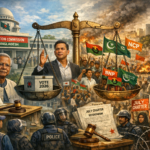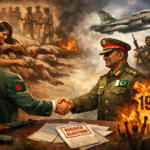The people of Bangladesh, a nation born from the sacrifices of millions, are witnessing an alarming shift in the political and ideological landscape. The new radical, pro-Islamic, and Pakistani-aligned interim government, supported by jingoistic elements within the armed forces, is not only rewriting the nation’s historical narrative but is also proactively provoking its closest ally, India. This dangerous and regressive trend jeopardises the very foundation of Bangladesh’s sovereignty, its hard-earned independence, and its historic alliance with India, which played a decisive role in its liberation.
A Betrayal of History
It is an undeniable truth that Bangladesh owes its independence to the resilience of its people and the unwavering support of India. In 1971, India provided not only military assistance but also shelter to millions of refugees fleeing the atrocities of the Pakistan Army. Indian soldiers shed blood alongside Mukti Bahini fighters to secure Bangladesh’s independence from a brutal regime. Yet, the current regime, under the guise of an interim government, appears hell-bent on maligning India’s role in the liberation war.
Through systematic propaganda, the government and its aligned armed forces are erasing India’s contributions from history books and public discourse. Instead, they are promoting narratives that downplay India’s support, seeking to replace it with a distorted version of events that aligns with a radical, pro-Pakistani ideology. This betrayal of history is not just an insult to India but also to the millions of Bangladeshis who fought for freedom under the banner of solidarity with India.
Pro-Islamic Radicalism: A Dangerous Shift
The rise of pro-Islamic radicalism within Bangladesh’s interim government signals a deliberate departure from the secular principles that defined the country’s founding. This radicalisation is not only reshaping domestic policies but also impacting Bangladesh’s foreign relations, particularly with India. By aligning itself ideologically with Pakistan,
The interim government is undermining the very principles upon which Bangladesh was established—principles rooted in linguistic, cultural, and religious pluralism. This shift is paving the way for a resurgence of Islamic fundamentalism, which threatens to destabilise the region and erode the socio-political gains Bangladesh has made over the decades.
Pro-Islamic radicalism is being weaponised to fuel anti-Indian sentiment within Bangladesh. The regime is using religion as a divisive tool, aligning with extremist groups to bolster its political legitimacy while undermining India’s contributions to Bangladesh’s independence. This not only alienates India but also risks fostering a culture of intolerance that could unravel the nation’s social fabric. Aligning ideologically with Pakistan—a state that once waged genocide against the Bengali people—represents the ultimate betrayal of Bangladesh’s liberation legacy.
Jingoistic Forces: Provocation Over Diplomacy
Compounding the problem is the increasing politicisation and radicalisation of Bangladesh’s armed forces. Historically, the armed forces have played a significant role in the nation’s politics, but the current alignment with jingoistic ideologies marks a dangerous escalation. This faction, emboldened by the government’s pro-Pakistan stance, is adopting an aggressive posture toward India, engaging in provocative rhetoric and actions that strain bilateral relations.
The armed forces are leveraging border skirmishes, inflammatory statements, and psychological operations to provoke India. These efforts aim to frame India as an adversary rather than the liberator it once was. Such jingoism disregards the shared cultural, economic, and historical ties between the two nations, replacing them with a manufactured narrative of hostility. This psychological warfare is designed not only to distract from internal failures but also to rally nationalist sentiment by creating an external enemy.
Psychological War Against India
The interim government and its allied armed forces are engaging in a covert psychological war against India, employing disinformation campaigns and state-sponsored propaganda to fuel mistrust and hostility. Social media platforms are inundated with fake narratives, often peddled by state-backed accounts, accusing India of meddling in Bangladesh’s internal affairs. These campaigns aim to sow seeds of doubt among the Bangladeshi public, turning India from a historical ally into a scapegoat for domestic issues.
This psychological war also extends to international diplomacy. The regime has been actively courting nations that share anti-Indian sentiments, attempting to isolate India on regional and global platforms. Such moves are not only shortsighted but also deeply damaging to Bangladesh’s long-term interests. Alienating India risks economic, strategic, and diplomatic isolation, as Bangladesh remains heavily reliant on India for trade, transit, and security cooperation.
Maligning India’s Support: A Grave Injustice
The interim regime’s maligning of India’s unwavering support for Bangladesh over the years is both unjust and ungrateful. Since 1971, India has been a steadfast partner, supporting Bangladesh through economic aid, infrastructural development, and regional security cooperation. India has played a pivotal role in addressing challenges like cross-border terrorism, human trafficking, and climate change that affect both nations.
Despite this, the current regime has chosen to demonise India, framing it as a hegemonic power rather than a partner. This narrative conveniently ignores India’s sacrifices during the liberation war, its acceptance of millions of refugees, and its ongoing efforts to ensure Bangladesh’s economic growth and regional stability. By framing India as an aggressor, the regime is not only rewriting history but also undermining the very partnership that has been integral to Bangladesh’s progress.
Aligning with Pakistan: A Dangerous Gamble
Perhaps the most baffling and alarming aspect of this ideological shift is the regime’s overt alignment with Pakistan. For a nation born out of the bloodshed inflicted by the Pakistani military, this realignment is an affront to the memories of those who perished in the 1971 genocide. Pakistan’s historical denial of its crimes in Bangladesh and its refusal to apologise for the atrocities make this alliance not only morally reprehensible but also strategically dangerous.
Pakistan’s influence in shaping the interim government’s policies suggests a broader agenda to destabilise the region. By fostering anti-Indian sentiment in Bangladesh, Pakistan aims to weaken India’s influence in South Asia while simultaneously exerting its own. This alignment is not about shared religious values but rather a calculated move to undermine India’s regional leadership and exploit Bangladesh’s internal divisions.
The Cost of Rewriting History
The interim government’s attempts to distort history and malign India come at a high cost. By erasing India’s contributions to Bangladesh’s independence, the regime risks alienating future generations from the truth. Historical revisionism not only dishonours the sacrifices of those who fought for independence but also undermines the nation’s identity and sovereignty.
This betrayal of history could have lasting implications. Bangladesh’s younger generations, fed a steady diet of propaganda, may grow up resenting India rather than valuing the deep historical ties that bind the two nations. This will not only strain bilateral relations but also weaken regional stability in South Asia.
Conclusion: A Call for Resistance
Bangladesh is at a crossroads. The radical turn taken by the interim government and its armed forces threatens to undo decades of progress and alienate the nation from its most important ally. The current regime’s pro-Pakistani alignment, radical Islamist policies, and psychological war against India are a betrayal of the principles that defined Bangladesh’s birth.
It is imperative for the people of Bangladesh to resist this dangerous trajectory. Civil society, intellectuals, and the diaspora must unite to protect the nation’s history, sovereignty, and secular identity. Bangladesh must reaffirm its commitment to the principles of the liberation war, honouring the sacrifices of its martyrs and the support of its allies, especially India.
India, too, must remain vigilant. While continuing to engage diplomatically, India must also expose the regime’s propaganda and strengthen its ties with the Bangladeshi people. A united, stable, and secular Bangladesh is in the best interest of both nations and the region.
The interim government’s radical agenda is a betrayal of the very soul of Bangladesh. The nation was built on the ideals of secularism, pluralism, and friendship with India. To abandon these principles is to abandon the essence of its independence. The people of Bangladesh must rise to reclaim their history, resist the forces of radicalism, and ensure that their nation does not become a pawn in a dangerous game of ideological realignment.






